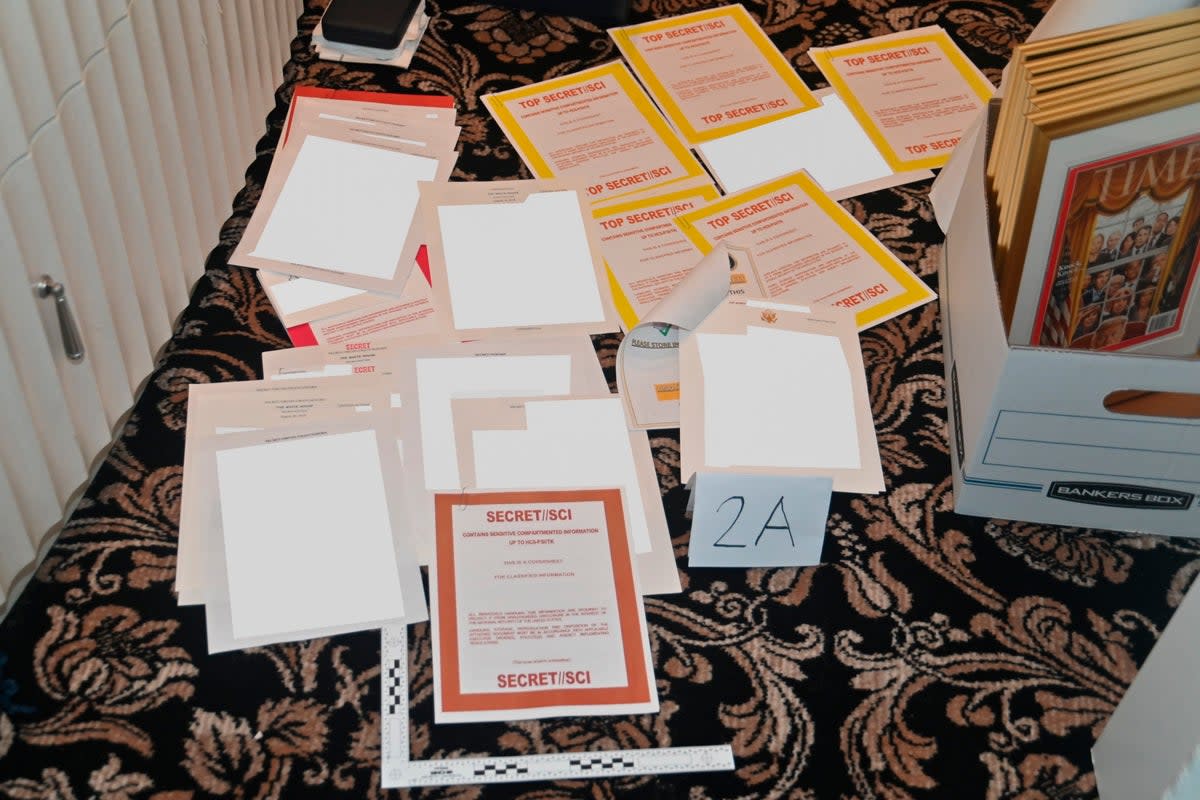Prosecutors ready to ask for Trump indictment on obstruction and Espionage Act charges

- Oops!Something went wrong.Please try again later.
The Department of Justice is preparing to ask a Washington, DC grand jury to indict former president Donald Trump for violating the Espionage Act and for obstruction of justice as soon as Thursday, adding further weight to the legal baggage facing Mr Trump as he campaigns for his party’s nomination in next year’s presidential election.
The Independent has learned that prosecutors are ready to ask grand jurors to approve an indictment against Mr Trump for violating a portion of the US criminal code known as Section 793, which prohibits “gathering, transmitting or losing” any “information respecting the national defence”.
The use of Section 793, which does not make reference to classified information, is understood to be a strategic decision by prosecutors that has been made to short-circuit Mr Trump’s ability to claim that he used his authority as president to declassify documents he removed from the White House and kept at his Palm Beach, Florida property long after his term expired on 20 January 2021.
That section of US criminal law is written in a way that could encompass Mr Trump’s conduct even if he was authorised to possess the information as president because it states that anyone who “lawfully having possession of, access to, control over, or being entrusted with any document ...relating to the national defence,” and “willfully communicates, delivers, transmits or causes to be communicated, delivered, or transmitted or attempts to communicate, deliver, transmit or cause to be communicated, delivered or transmitted the same to any person not entitled to receive it, or willfully retains the same and fails to deliver it on demand to the officer or employee of the United States entitled to receive it” can be punished by as many as ten years in prison.
It is understood that prosecutors intend to ask grand jurors to vote on the indictment on Thursday, but that vote could be delayed as much as a week until the next meeting of the grand jury to allow for a complete presentation of evidence, or to allow investigators to gather more evidence for presentation of necessary.
A separate grand jury that is meeting in Florida has also been hearing evidence in the documents investigation. That grand jury was empaneled in part to overcome legal issues posed by the fact that some of the crimes allegedly committed by Mr Trump took place in that jurisdiction, not in Washington. Under federal law, prosecutors must bring charges against federal defendants in the jurisdiction where the crimes took place.
Another source familiar with the matter has said Mr Trump was recently informed that he is a “target” of the Justice Department probe, which began in early 2022 after National Archives and Records Administration officials discovered more than 100 documents bearing classification markings in a set of 15 boxes of Trump administration records retrieved from Mar-a-Lago, the century-old mansion turned private beach club where Mr Trump maintains his primary residence and post-presidential office.
Over the course of the last year, grand jurors have heard testimony from numerous associates of the ex-president, including nearly every employee of Mar-a-Lago, former administration officials who worked in Mr Trump’s post-presidential office and for his political operation, and former high-ranking administration officials such as his final White House chief of staff, Mark Meadows.
Mr Meadows has already given evidence before the grand jury and is said to be cooperating with the investigation into his former boss. It is understood that the former North Carolina congressman will plead guilty to several federal charges as part of a deal for which he has already received limited immunity in exchange for his testimony.
Prosecutors are also prepared to ask grand jurors to indict Mr Trump on charges that he obstructed justice during the year-long investigation and caused false statements to be made to investigators by persons working for him.
It is possible that such charges could stem from a declaration submitted to federal investigators roughly a year ago, when FBI agents and prosecutors visited his home to retrieve a sealed folder filled with 38 classified documents which Mr Trump’s attorneys turned over in response to a grand jury subpoena.
According to court documents, the government subsequently developed evidence indicating that documents had been removed from a storage room where his attorneys had stated that all such documents were being stored in the days following the receipt of the grand jury subpoena.
Using that evidence, which reportedly includes surveillance footage taken by cameras placed in the interior of Mar-a-Lago, prosecutors obtained a search warrant for the property that was carried out by FBI agents on 8 August last year.
During that search, special agents discovered 103 documents bearing classification markings, including 18 marked “top secret,” 54 marked “secret,” and 31 marked as “confidential,” including a number of documents that were stored in Mr Trump’s personal office.

